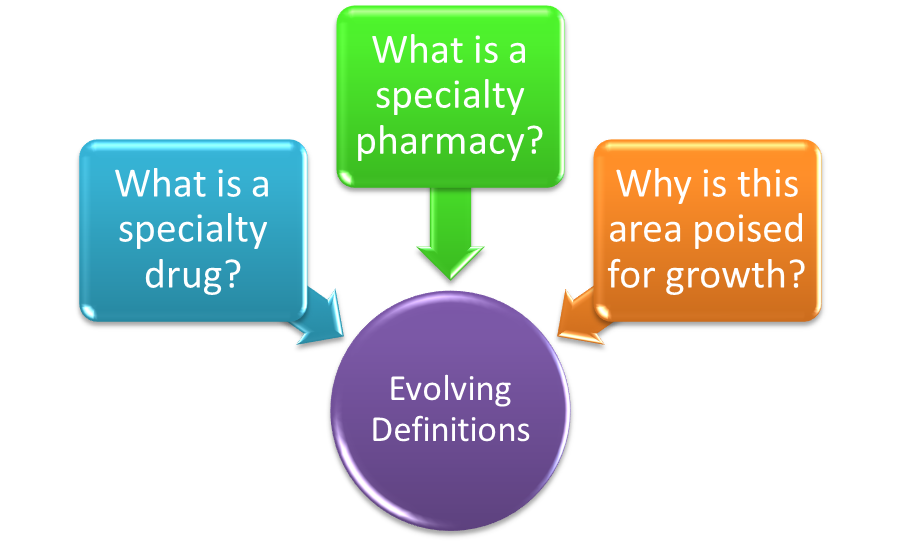Definitions Evolving: What is a Specialty Pharmacy
There has been a lot of buzz in the healthcare world lately about “specialty pharmacy” as an opportunity for rapid growth, financial opportunity, and expansive change, however there is some debate as to what exactly constitutes a specialty pharmacy. Here we will examine that questions and look at some of the definitions that have been recently emerging by focusing on three key questions:
Definitions Evolving: What is a Specialty Pharmacy
There has been a lot of buzz in the healthcare world lately about “specialty pharmacy” as an opportunity for rapid growth, financial opportunity, and expansive change, however there is some debate as to what exactly constitutes a specialty pharmacy. Here we will examine that questions and look at some of the definitions that have been recently emerging by focusing on three key questions:
What is a Specialty Drug?
Specialty Pharmacies are most often focused on the dispensation of specialty drugs. While there is no standardized definition of what constitutes a specialty drug, most often the meet the following criteria:
- the drug is a specialized, high cost product (typically more than $500 per dose or $6000 or more per year)
- the drug is utilized as a complex therapy for a complex disease
- the drug requires special handling or administering, shipping, or storage (such as an injectable)
- the drug may have a Food and Drug Administration (FDA) Risk Evalaution and Mitigation Strategy (REMS) in place specifying that there is required training, certifications, or other requirements that must be met in order for the drug to be administered.
- The drug has the potential for significant waste due to high cost
Specialty drugs are used to treat a variety of complex and chronic conditions including but not limited to: anemia, cancer, infertility, multiple sclerosis, HIV and hepatitis. Some categorize specialty drugs as meeting all of the three H’s: High Cost, High Complexity, High Touch
Because of the specialized way in which these drugs need to be administered, specialty pharmacies come into play with a specific focus on this group of drugs and the required comprehensive and coordinated delivery and support required to effectively deliver these drugs to patients. leading us to the question “What is a Specialty Pharmacy?”
What is a Specialty Pharmacy?
Now that we have identified what a specialty drug is, we can begin to touch on what constitutes a specialty pharmacy. In broad terms, a specialty pharmacy is a specific type of pharmaceutical delivery system which coordinates delivery and offers comprehensive support in the distribution of drugs which are high cost or complex and utilized to treat complex conditions.
The Academy of Managed Care Pharmacy (AMCP) in a recent publication entitled Format for Formulatary Submission, version 3.1 defined specialty pharmacy as the following:
“Specialty pharmacies are distinct from traditional pharmacies in coordinating many aspects of patient care and disease management. They are designed to efficiently deliver medications with specialized handling, storage, and distribution requirements with standardized processes that permit economies of scale. Specialty pharmacies are also designed to improve clinical and economic outcomes for patients with complex, often chronic and rare conditions, with close contact and management by clinicians. health care professionals employed by specialty pharmacies provide patient education, help ensure appropriate medication use, promote adherence, and attempt to avoid unnecessary costs. Other support systems coordinate sharing of information among clinicians treating patients and help patients locate resources to provide financial assistance with out of pocket expenditures.”What we are essentially seeing is a distinct new entity emerging in the form of Specialty Pharmacy that collaborates and coordinate for patients on a much more meaningful level than expected by traditional pharmacies. Not only do specialty pharmacies specialize in the administration of specific medications, they also work to educate patients, conduct coordination regarding care, and manage inefficiencies related to cost providing a service in which the pharmacist and patient are much more collaborative and closely connected. In addition to this being a newly emerging care model, statistics have shown that the emergence of specialty pharmacies has gained incredible momentum in recent years, which brings us to our third question:
Why is This Area Poised For Growth?
The specialty pharmacy care model is being supported by several initiatives and is another way in which healthcare providers are looking to improve patient care while effectively managing costs in one coordinated system. This means that the specialty pharmacy model is in the right place at the right time from a care provision perspective. Add to this the explosion in specialty drugs.
- “Within 4 years, specialty drugs will account for 40% to 45% of pharmaceutical manufacturer sales” Specialty Pharmacy Today
- “7 of the top 10 bestselling drugs (by revenue) are projected to be specialty drugs in 2016 compared with 3 in 2010″ EvaluatePharma
- Furthermore, according to Jon Haas, VP, Managed Markets, Palio “in 1990 there were 10 specialty drugs on the market, while in 2010 there were 250 specialty drugs”
Growth for this segment of the healthcare industry is undeniable, and specialty pharmacies will begin to see much more competition in the coming years and should begin positioning themselves for success early to capitalize on the expected gains in their market over the next decade. One of the ways that specialty pharmacies can accomplish this is through pharmacy accreditation. Later this week will will focus on the two accrediting bodies for specialty pharmacy accreditation, and how accreditation can give specialty pharmacies a strategic advantage in the marketplace.
